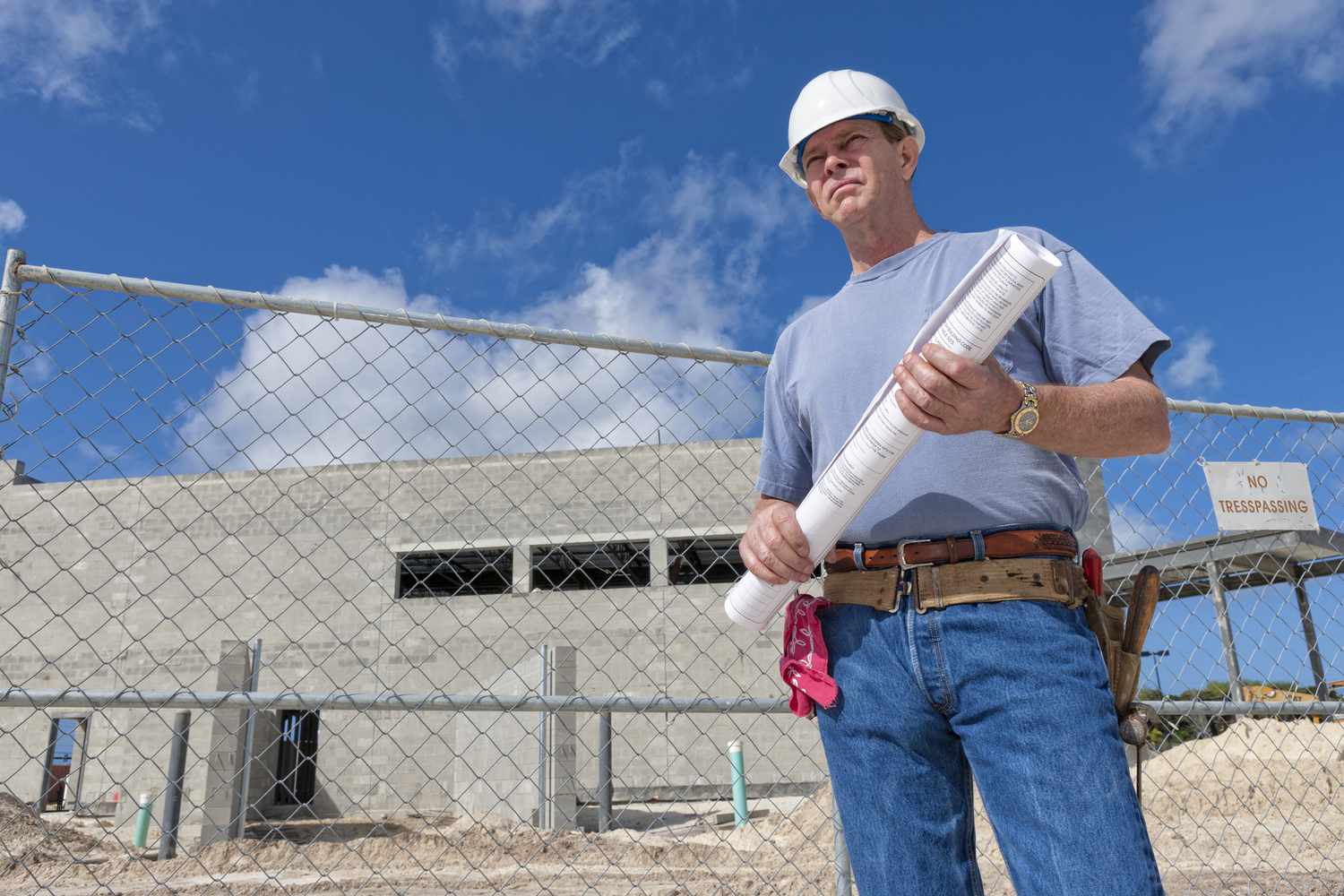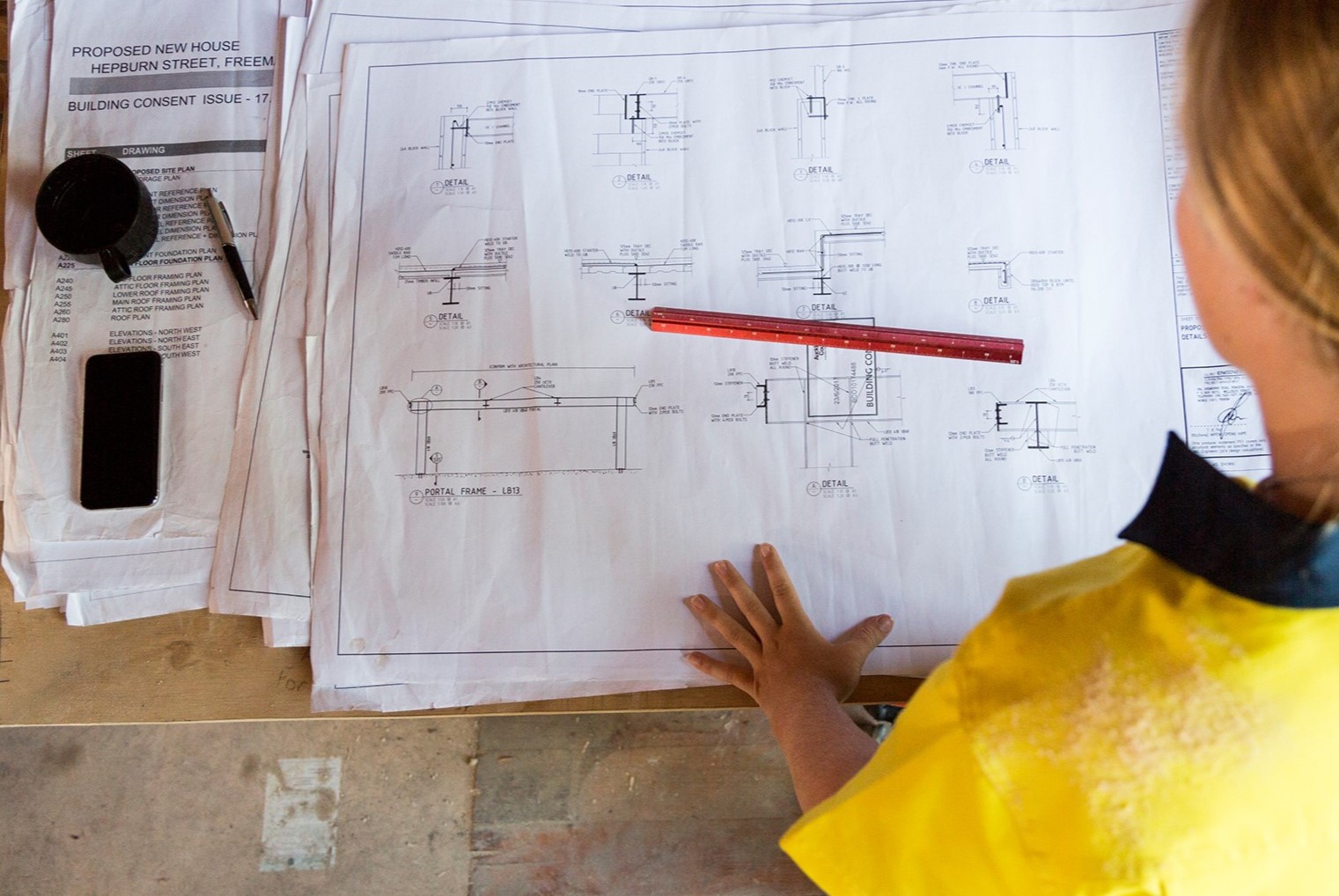Home>diy>Building & Construction>How To Become A Construction Lawyer


Building & Construction
How To Become A Construction Lawyer
Modified: September 1, 2024
Learn how to become a construction lawyer and specialize in building construction law. Gain expert knowledge in legal issues related to the construction industry.
(Many of the links in this article redirect to a specific reviewed product. Your purchase of these products through affiliate links helps to generate commission for Storables.com, at no extra cost. Learn more)
Introduction
Welcome to the world of construction law, where the worlds of building and legal expertise intersect. Construction lawyers play a crucial role in the construction industry, ensuring that legal matters are addressed and resolved effectively. If you have a passion for both law and the construction process, pursuing a career as a construction lawyer may be the perfect fit for you.
In this article, we will explore the path to becoming a construction lawyer, including the education and training requirements, gaining practical experience, developing key skills, building a network, obtaining licensing and certification, and exploring various career opportunities. Let’s dive in!
Key Takeaways:
- Becoming a construction lawyer requires a JD degree, specialized coursework, practical experience, and state bar admission. Developing key skills, building a network, and pursuing continual professional development are essential for success in this field.
- Career opportunities for construction lawyers include private practice, in-house counsel roles, and government positions. Certification in construction law and staying updated with industry developments are crucial for establishing expertise in the field.
Read more: How To Become A Journeyman Construction
Education and Training Requirements
To become a construction lawyer, the first step is to pursue a Juris Doctor (JD) degree from an accredited law school. Admission to law school typically requires a bachelor’s degree, satisfactory Law School Admission Test (LSAT) scores, and letters of recommendation.
During your time in law school, it is beneficial to focus on courses related to construction law or contracts law. Although specialization in construction law is not a mandatory requirement, it can give you a competitive edge in the job market and provide you with the necessary knowledge and skills needed for a successful career in this field.
Some law schools offer elective courses specifically tailored to construction law, including classes on construction contracts, construction litigation, and construction regulations. Taking these courses can provide you with a solid foundation in understanding the legal aspects of the construction industry.
In addition to coursework, engaging in extracurricular activities related to construction law can further enhance your knowledge and networking opportunities. Participating in moot court competitions or joining law school organizations focused on construction law can give you practical experience and a chance to interact with professionals in the field.
After completing law school, you will need to pass the bar exam in the state where you plan to practice. Each state has its own bar exam requirements, so it’s important to research and prepare specifically for the jurisdiction you are targeting. Passing the bar exam is a crucial step as it grants you the license to practice law.
Once you have obtained your law license, you can begin your journey towards specializing in construction law. Some professionals choose to work as general litigation attorneys for a few years before transitioning into construction law, while others may start their careers directly in construction law firms or in-house legal departments of construction companies.
While specialization in construction law is not mandatory, it can provide you with a deeper understanding of the unique legal issues that arise in the construction industry. Specialized construction law courses and programs can help you gain the knowledge and skills necessary to handle complex construction contracts, navigate construction-related disputes, and advise clients on compliance with construction regulations.
By specializing in construction law, you can position yourself as a valuable resource for clients in the construction industry, and you will be better equipped to handle the specific challenges that arise in this field.
Gaining Experience
After completing your education and obtaining your law license, gaining practical experience is crucial to becoming a successful construction lawyer. There are several avenues to consider when it comes to gaining experience in the field of construction law.
One of the most effective ways to gain valuable experience is by joining a construction law firm. Construction law firms specialize in handling legal matters related to the construction industry, including contract negotiations, dispute resolution, and regulatory compliance. By joining such a firm, you will have the opportunity to work on real-life construction cases and learn from experienced lawyers in the field.
Working with construction professionals is another excellent way to gain hands-on experience in the industry. Collaborating with architects, engineers, contractors, and other construction stakeholders will give you valuable insights into the construction process and help you understand the unique legal challenges they face. This experience can provide you with a well-rounded perspective and strengthen your ability to provide effective legal advice to clients in the construction industry.
Internships and clerkships are invaluable opportunities for aspiring construction lawyers to gain practical experience and make professional connections. Many law firms, construction companies, and government agencies offer internships or clerkship programs that allow law students or recent graduates to work alongside seasoned professionals. These programs provide the chance to observe and participate in real-world construction law cases, conduct legal research, draft legal documents, and gain exposure to the inner workings of the industry. An internship or clerkship can be instrumental in building your resume, expanding your network, and securing future job opportunities.
Moreover, pursuing pro bono work in construction law can provide additional experience and demonstrate your dedication to the field. Pro bono cases allow you to assist clients who may not be able to afford legal representation, opening the door to a wider range of construction law matters and allowing you to apply your skills to make a positive impact in the community.
Overall, gaining experience through joining construction law firms, working with construction professionals, and engaging in internships, clerkships, and pro bono work, will not only strengthen your skills and knowledge but also enhance your credibility as a construction lawyer.
Developing Key Skills
To excel as a construction lawyer, it is essential to develop and hone certain key skills that are crucial in this field. These skills will enable you to effectively navigate the complex legal landscape of the construction industry and provide valuable assistance to your clients. Here are three key skills to focus on:
1. Legal Research and Writing
Strong legal research and writing skills are at the core of every successful lawyer’s toolkit. As a construction lawyer, you will be required to conduct in-depth research on complex legal issues, analyze relevant statutes, regulations, and case law, and effectively communicate your findings in written form.
Developing excellent research skills involves mastering legal databases, using advanced search techniques, and staying updated on the latest developments in construction law. Additionally, practicing clear and concise legal writing is crucial to effectively communicate your findings and arguments to clients, judges, and opposing counsel.
Regular practice and feedback, as well as taking advanced legal writing courses, can greatly enhance these skills and make you a more effective construction lawyer.
Read more: How To Become A Construction Estimator
2. Negotiation and Dispute Resolution
The ability to negotiate and resolve disputes is a critical skill for construction lawyers. Construction projects often involve various parties with competing interests, and conflicts can arise at any stage of the project. Your role as a construction lawyer will often involve guiding clients through negotiation processes, facilitating dispute resolution, and advocating for their best interests.
Developing excellent negotiation and dispute resolution skills requires a combination of knowledge, strategy, and effective communication. Understanding the specific needs and goals of your client, maintaining professionalism and objectivity, and exploring creative solutions are key elements of successful negotiation and dispute resolution in construction law.
Engaging in negotiation workshops, participating in mediation training programs, and seeking mentorship from experienced construction lawyers can help you develop and refine these essential skills.
3. Knowledge of Construction Industry Regulations
Construction is a heavily regulated industry, and as a construction lawyer, you must have a deep understanding of the relevant regulations and standards that govern it. Familiarize yourself with federal, state, and local laws and regulations that impact construction projects, such as building codes, zoning laws, safety regulations, and environmental compliance requirements.
Stay updated on any changes or updates to these regulations, as they can significantly impact your clients’ projects and legal obligations. Being well-versed in construction industry regulations will enable you to provide accurate and comprehensive legal advice and ensure that your clients are in compliance with all applicable laws.
Continuing education programs, attending industry conferences, and actively engaging in industry associations and forums can help you stay ahead of the curve and maintain your knowledge of construction industry regulations.
By developing these key skills – legal research and writing, negotiation and dispute resolution, and knowledge of construction industry regulations – you will be well-equipped to handle the complex legal challenges that arise in the construction industry and provide valuable assistance to your clients.
Building a Network
Building a strong professional network is essential for success as a construction lawyer. By connecting and engaging with other professionals in the field, you can gain valuable insights, access new opportunities, and establish yourself as a trusted advisor in the construction industry. Here are three strategies to help you build a robust network:
1. Joining Professional Associations
One of the most effective ways to network with other construction law professionals is by joining relevant professional associations. Associations such as the American Bar Association’s Construction Law Section, the Construction Lawyers Society of America, and the International Construction Law Association provide valuable resources, networking events, and educational opportunities specifically tailored to construction lawyers.
Membership in these associations allows you to connect with attorneys, judges, and other professionals specializing in construction law. It provides access to industry-specific publications, webinars, and conferences, where you can expand your knowledge, share insights, and foster professional relationships.
Read more: How To Become A Construction Safety Manager
2. Attending Industry Events
Attending industry conferences, seminars, and workshops is an excellent way to expand your network and stay updated on the latest developments in the construction industry. Look for events that specifically focus on construction law or broader construction industry gatherings.
During these events, take advantage of networking breaks, panel discussions, and social activities to engage with fellow attendees. Be proactive in introducing yourself, exchanging contact information, and initiating conversations with professionals who share your interests or expertise. These interactions can lead to valuable connections and potential collaboration opportunities in the future.
3. Networking with Construction Professionals
In addition to networking with other construction lawyers, it is crucial to build relationships with professionals in the broader construction industry. Connect with architects, engineers, contractors, developers, and other construction stakeholders to expand your network and gain insights into their needs and challenges.
Attend industry-related events, such as trade shows, construction project kick-off meetings, or industry focus groups, to meet and engage with these professionals. Actively participate in discussions, ask insightful questions, and demonstrate your understanding of the industry. Building relationships with construction professionals can lead to referrals, collaborative opportunities, and a deeper understanding of the construction process.
Building a network takes time and effort. Be proactive in reaching out to individuals, maintaining contact, and nurturing relationships. Remember to offer help and support to your network as well, as networking is a two-way street.
By joining professional associations, attending industry events, and actively networking with construction professionals, you will expand your reach, establish yourself as a knowledgeable construction lawyer, and open doors to new opportunities in the field.
Licensing and Certification
Obtaining the necessary licensing and certification is an important step towards establishing yourself as a qualified and reputable construction lawyer. There are two key aspects to consider – state bar admission and certification in construction law.
1. State Bar Admission
Before practicing law as a construction lawyer, you must be admitted to the state bar where you plan to practice. Each state has its own requirements, which typically include passing the bar exam and meeting character and fitness qualifications. It is essential to research the specific requirements of the state you wish to practice in and prepare accordingly.
Preparing for the bar exam involves studying various areas of law, including contracts, torts, property, and criminal law. Although construction law is not always a separate subject on the bar exam, the knowledge and skills you gained during law school and any specialized construction law courses will be invaluable in answering related questions accurately.
Passing the bar exam demonstrates your competence in the general principles of law and allows you to practice law within the jurisdiction of the specific state.
Read more: How To Become A Construction Draw Inspector
2. Certification in Construction Law
While certification in construction law is not mandatory, it can distinguish you as an expert in the field and enhance your credibility among clients and peers. Certification programs typically require lawyers to meet certain criteria, such as a minimum number of years of experience practicing construction law, peer references, and passing a rigorous examination.
Organizations such as the American Bar Association’s Forum on Construction Law, the National Board of Legal Specialty Certification, and some state-level bar associations offer certification programs specifically tailored to construction law. These programs assess your knowledge, experience, and professional competence in the field.
Attaining certification in construction law signifies your commitment to staying updated with industry developments and your dedication to providing high-quality legal services to clients in the construction industry. It can also open up new career opportunities and increase your visibility among potential clients and employers.
Obtaining state bar admission and seeking certification in construction law are crucial steps in establishing your legal expertise in the field of construction law. They demonstrate your competency, professionalism, and commitment to providing exceptional legal services to clients in the construction industry.
Career Opportunities
As a construction lawyer, there are various career paths you can explore. Whether you aspire to work in a law firm, in-house for a construction company, or in the public sector, the field of construction law offers a diverse range of opportunities. Here are three common career paths:
1. Private Practice
Many construction lawyers choose to work in private practice, either in small boutique firms or large law firms with dedicated construction law departments. Private practice allows you to work with a variety of clients, including contractors, subcontractors, developers, and other construction professionals.
Working in a law firm gives you the opportunity to handle a wide range of construction-related legal matters, such as contract negotiations, dispute resolution, insurance claims, and litigation. You may also have the chance to work on both commercial and residential construction projects, providing you with diverse experiences and challenges.
Private practice offers the potential for higher earnings and the ability to build a personal brand as a construction law expert. It also provides the flexibility to focus on specific niche areas within construction law, such as green building, public-private partnerships, or international construction projects.
2. In-House Counsel for Construction Companies
Another career opportunity in construction law is working as an in-house counsel for construction companies. In this role, you would be employed directly by a construction company or a real estate development firm to provide legal advice and guidance on a range of construction-related issues.
As an in-house counsel, you would have the opportunity to work closely with project managers, engineers, and other professionals within the company to navigate legal challenges, review contracts, and ensure compliance with industry regulations. This role offers a deeper level of involvement in the day-to-day operations of construction projects.
In-house counsel positions provide the advantage of being intimately familiar with your client’s business and goals, allowing you to provide more targeted and strategic legal advice. You may also have opportunities for career growth within the company, such as moving into management roles.
Read more: How To Become A Construction Sign Holder
3. Government and Public Sector Jobs
The government and public sector also offer career opportunities for construction lawyers. These positions may be with federal, state, or local government agencies, such as departments of transportation, housing authorities, or regulatory agencies.
In government roles, you may be involved in drafting and interpreting construction-related regulations, reviewing public contracts, or representing the government in construction litigation. Working in the public sector allows you to contribute to the creation and enforcement of laws and regulations that impact the construction industry.
Government positions often offer stability, competitive salaries, and opportunities for work-life balance. They can also provide the chance to influence policy-making and drive positive changes in the construction industry.
Each of these career paths has its own advantages and considerations. It is important to evaluate your interests, professional goals, and work style to determine which path aligns best with your aspirations as a construction lawyer.
Professional Development
Continual professional development is vital in the field of construction law to stay relevant, expand your knowledge, and enhance your skills. By actively pursuing ongoing education and staying updated with the latest developments in construction law, you can provide the best legal counsel to your clients and maintain a competitive edge in your career. Here are two key aspects of professional development for construction lawyers:
1. Continuing Legal Education (CLE)
Continuing Legal Education (CLE) programs offer an opportunity for lawyers to further their knowledge and skills in specific areas of law. Many jurisdictions require lawyers to complete a certain number of CLE credits each year to maintain their law licenses.
When it comes to construction law, CLE programs can provide in-depth insights into specialized topics such as construction contracts, construction litigation, alternative dispute resolution in construction, and emerging trends in the industry. By attending these programs, you can learn from industry experts, stay updated with changes in laws and regulations, and gain practical strategies for effectively handling construction-related legal matters.
Additionally, some professional associations offer certification programs or specialized CLE tracks specifically tailored to construction law. Pursuing these programs can demonstrate your commitment to professional development and distinguish you as an expert in the field.
2. Staying Updated with Construction Law Developments
The field of construction law is dynamic, with laws, regulations, and legal precedents continually evolving. To stay informed and ensure you are providing the most up-to-date advice to your clients, it is essential to stay attuned to construction law developments.
Engage in regular legal research and subscribe to industry publications, online forums, and newsletters that cover construction law updates. These resources provide valuable insights into recent court decisions, changes in legislation, and emerging trends in the construction industry.
Attending conferences, seminars, and webinars that focus on construction law can also be an effective way to stay updated and learn from industry leaders and experts. These events often provide opportunities to network with fellow professionals and gain insights into best practices and emerging issues in the field.
Additionally, staying connected with construction law colleagues through professional associations and online communities can provide a platform for sharing knowledge, discussing recent developments, and seeking guidance on complex legal issues.
Professional development is an ongoing commitment. By actively pursuing continuing legal education and staying updated with construction law developments, you can enhance your expertise, provide the highest level of service to your clients, and position yourself as a trusted and reliable construction lawyer.
Conclusion
Becoming a construction lawyer is a rewarding and challenging journey that combines both legal expertise and knowledge of the construction industry. As demonstrated throughout this article, there are several key steps and considerations to keep in mind when pursuing a career in construction law.
Education and training requirements, such as obtaining a Juris Doctor (JD) degree and specializing in construction law, provide a strong foundation for your career. Gaining practical experience through internships, clerkships, and working with construction professionals is essential to understanding the intricacies of the construction industry and honing your legal skills.
In order to excel as a construction lawyer, it is important to develop key skills such as legal research and writing, negotiation and dispute resolution, and a deep understanding of construction industry regulations. These skills will enable you to provide effective legal advice and representation to your clients.
Building a strong network by joining professional associations, attending industry events, and networking with construction professionals is crucial for career growth and access to new opportunities.
Obtaining state bar admission and considering certification in construction law further solidify your reputation and expertise in the legal field.
As a construction lawyer, you have a range of career opportunities available to you, from private practice to in-house counsel positions for construction companies, as well as government and public sector jobs. The choice depends on your interests, goals, and preferred work environment.
Continual professional development is essential in construction law. Engaging in continuing legal education (CLE) programs and staying updated with construction law developments ensures that you stay current with industry trends and provide the best legal counsel to your clients.
In conclusion, pursuing a career as a construction lawyer requires dedication, a strong knowledge base, and an understanding of the unique legal challenges within the construction industry. By following the path outlined in this article and continuously developing your skills, you can establish yourself as a respected and knowledgeable construction lawyer, ready to navigate the complex legal landscape of the construction industry.
Good luck on your journey to becoming a construction lawyer!
Frequently Asked Questions about How To Become A Construction Lawyer
Was this page helpful?
At Storables.com, we guarantee accurate and reliable information. Our content, validated by Expert Board Contributors, is crafted following stringent Editorial Policies. We're committed to providing you with well-researched, expert-backed insights for all your informational needs.











0 thoughts on “How To Become A Construction Lawyer”